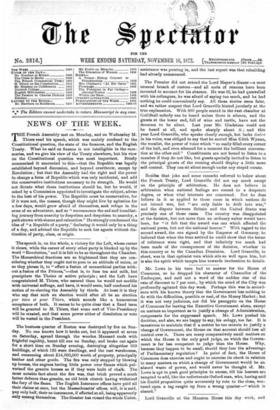Mr. Lowe in his tarn had to answer for the
House of Commons, so he dropped his character of Chancellor of the Exchequer, and said not a word of the sudden rise of the rate of discount to 7 per cent., by which the mind of the City was profoundly agitated this day week. Perhaps this was in accord- ance with his known theory that the Government has nothing to do with the difficulties, possible or real, of the Money Market ; but it was not very judicious, nor did his panegyric on the House of Commons for leaving the Executive Government alone, except on matters so important as to justify a change of Administration, compensate for the suppressed speech. Mr. Lowe pushed his doctrine, and also, we are happy to say, his eulogy, too far. It is monstrous to maintain that if a matter be too minute to justify a change of Government, the House on that account should lose all control over it. There are many comparatively small matters on which the House is the only good judge, on which the Govern- ment is far less competent to judge than the House. Why, because they happen to be small, should they lose the advantage of Parliamentary regulation ? In point of fact, the House of Commons does exercise and ought to exercise its check in relation to many matters on which a change of Government would be an absurd waste of power, and would never be thought of. Mr. Lowe is apt to push good principles to excess, till his hearers are tempted to add, like the unfortunate Oxford man, who, having said his Euclid proposition quite accurately by rote to the close, ven- tured upon a tag caught up from a wrong quarter—" which is absurd."


































